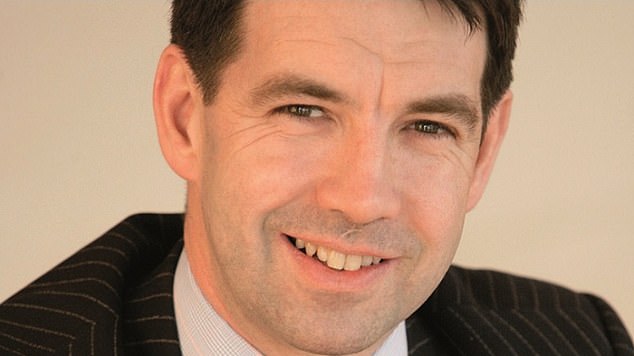M&G Recovery manager Tom Dobell to step away from struggling £1.4bn fund after 20 years in charge
- Over the past ten years, the fund has returned just 6.7 per cent to investors
- A value fund invests in stocks that its managers believe are undervalued in price
- This style of investing has endured a hard time with growth stocks favoured
The manager of the £1.4billion M&G Recovery Fund Tom Dobell is stepping down after two decades at the helm following many years of poor returns.
He will be replaced by the fund’s deputy manager Michael Stiasny, who has also spent 20 years at M&G and formerly headed the company’s equity research team.
The City firm said the change comes as part of a review into its mutual fund range that will ‘refresh its investment approach‘ and put greater focus on medium-sized firms ‘that have contributed most to value creation over the fund’s lifetime.’

Tom Dobell will depart almost exactly a year after Hargreaves Lansdown kicked the fund off its Wealth 50 list
M&G chief investment officer Jack Daniels said: ‘I’d like to thank Tom for his dedication to the M&G Recovery fund and its investors.
‘While the environment for his style of investing over the past decade has been very challenging, his effort and commitment on behalf of customers have never faltered.’
Over the past ten years, the fund has returned just 6.7 per cent to investors compared to an 81.9 per cent average among rival funds in the Investment Association’s UK All Companies sector, ranking it near the bottom for performance.
For the first half of his tenure in charge though, his value investing strategy achieved greater returns for M&G Recovery than the wider fund sector. At its height, it was managing over £8billion. But since 2012, the fund has consistently underperformed.
A value fund invests in stocks that its managers believe are undervalued in price. It is often distinguished from growth funds, which focus on businesses that are expected to expand at a faster pace than the broader stock market.
M&G noted that despite the fund’s troubles, Dobell had attained a 127.7 per cent cumulative return after fees against a 118.4 per cent return among FTSE All-Share Index between becoming its manager and September 11 last week.
Dobell thanked M&G ‘for the opportunities it has given me throughout my career. It’s been an immense privilege to manage the M&G Recovery fund, even throughout challenging investment cycles.
‘I leave the fund’s investors in the capable hands of Michael Stiasny and I wish them the very best for the future.’


But since 2012, the fund has consistently under-performed, and when Hargreaves Lansdown relegated the fund from its Wealth 50 list in December 2019, it was valued at £2.1billion
Ryan Hughes, head of active portfolios at AJ Bell, commented ‘News that Tom Dobell has stepped down from running the M&G Recovery fund, the UK’s oldest unit trust, and hand responsibility to Michael Stiasny after 20 years will come as important news to the many investors who have stuck with the fund despite its poor performance over a number of years.’
‘Tom delivered some fantastic performance for investors when his value style was in favour and the fund grew to be one of the largest UK equity funds at the time.
‘However, as investors moved away from value and towards growth, performance really struggled, a fact perfectly illustrated by the performance chart which shows performance relative to the FTSE All Share during his tenure, Hughes continued.
‘Dobell admitted himself that the fund became too large and had too many stocks in a rare moment of contrition from a fund manager.’

